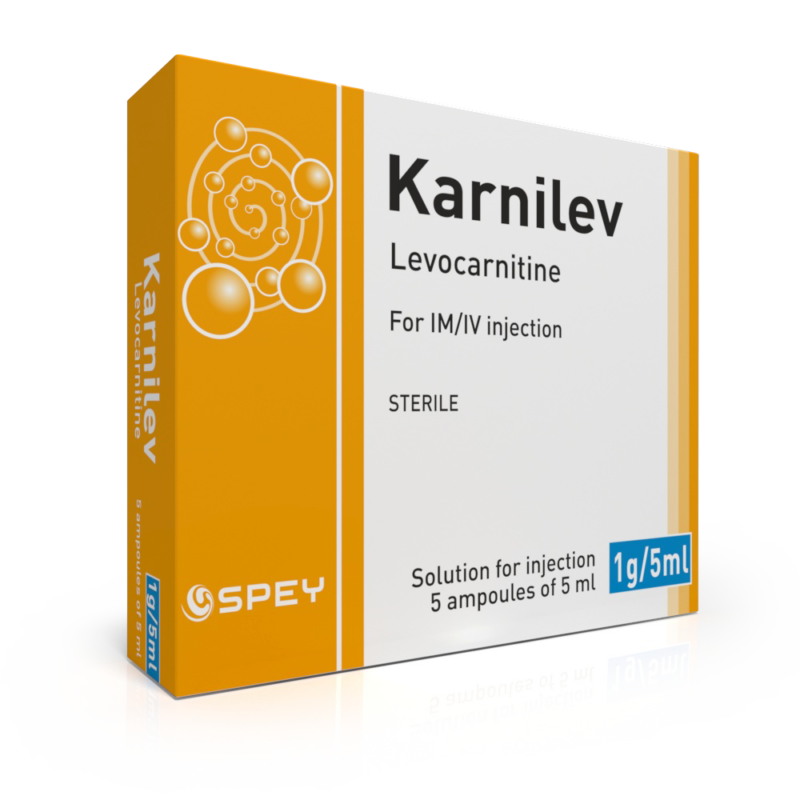
L-carnitine belongs to substances that contribute to the smooth development of the physiological functions of the body and mainly through metabolism.
Active ingredient: Levocarnitine (L-carnitine).
Excipients for solution for injection: Hydrochloric Acid 10%, Water for Injection.
1.3 Drug formulation: Solution for injection
1.4 Concentration of the active ingredient:
Each 1ml of injection solution contains 200mg L-Carnitine.
It is administered in cases that L-carnitine in body is insufficient and supplementation is needed to reach normal levels.
Oral administration
Primary and secondary L-carnitine deficiency
Intravenous administration
Acute metabolic deregulation due to L-carnitine deficiency
Secondary L-carnitine deficiency in haemodialysis patients with end stage renal insufficiency
Injection solution is administered by slow (2-3 minutes) intravenous injection or infusion.
In cases of acute metabolic deregulation, it is administered intravenously in dosages of 50-100 mg/kg of body weight daily in 3-4 divided doses. Higher doses may be used, if necessary, although an increase in adverse events, primarily diarrhoea, may occur.
Secondary carnitine deficiency in haemodialysis patients with end stage renal insufficiency
A dose of 10-20mg/kg of body weight is administered intravenously at the end of dialysis session that is performed at a period of three sessions per week. The duration of intravenous administration should be up to 3 months to restore muscle levels of L- carnitine. The need for repeating the treatment is assessed by patient’s condition and by repeated monitoring plasma L- carnitine levels.
Haemodialysis – maintenance dose
If clinical benefit has been gained by intravenous administration, it can be maintained by daily administration of 1g of L-carnitine orally. On the day of the dialysis, L-carnitine has to be administered at the end of the session. In order to define the optimal dosage in the above cases, it is advisable to monitor outcome of the therapy by measuring free and acyl L-carnitine levels in plasma and urine.
Active ingredient: Levocarnitine (L-carnitine).
Excipients for solution for injection: Hydrochloric Acid 10%, Water for Injection.
1.3 Drug formulation: Solution for injection
1.4 Concentration of the active ingredient:
Each 1ml of injection solution contains 200mg L-Carnitine.
It is administered in cases that L-carnitine in body is insufficient and supplementation is needed to reach normal levels.
Oral administration
Primary and secondary L-carnitine deficiency
Intravenous administration
Acute metabolic deregulation due to L-carnitine deficiency
Secondary L-carnitine deficiency in haemodialysis patients with end stage renal insufficiency
Injection solution is administered by slow (2-3 minutes) intravenous injection or infusion.
In cases of acute metabolic deregulation, it is administered intravenously in dosages of 50-100 mg/kg of body weight daily in 3-4 divided doses. Higher doses may be used, if necessary, although an increase in adverse events, primarily diarrhoea, may occur.
Secondary carnitine deficiency in haemodialysis patients with end stage renal insufficiency
A dose of 10-20mg/kg of body weight is administered intravenously at the end of dialysis session that is performed at a period of three sessions per week. The duration of intravenous administration should be up to 3 months to restore muscle levels of L- carnitine. The need for repeating the treatment is assessed by patient’s condition and by repeated monitoring plasma L- carnitine levels.
Haemodialysis – maintenance dose
If clinical benefit has been gained by intravenous administration, it can be maintained by daily administration of 1g of L-carnitine orally. On the day of the dialysis, L-carnitine has to be administered at the end of the session. In order to define the optimal dosage in the above cases, it is advisable to monitor outcome of the therapy by measuring free and acyl L-carnitine levels in plasma and urine.